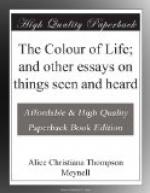It is not long since there took place upon the principal stage in London the most important event in donkey-racing ever known until that first night. A tragedian and a secondary actor of renown had a duet together. It was in “The Dead Heart.” No one who heard it can possibly have yet forgotten it. The two men used echoes of one another’s voice, then outpaused each other. It was a contest so determined, so unrelaxed, so deadly, so inveterate that you might have slept between its encounters. You did sleep. These men were strong men, and knew what they wanted. It is tremendous to watch the struggle of such resolves. They had their purpose in their grasp, their teeth were set, their will was iron. They were foot to foot.
And next morning you saw by the papers that the secondary, but still renowned, actor, had succeeded in sharing the principal honours of the piece. So uncommonly well had he done, even for him. Then you understood that, though you had not known it, the tragedian must have been beaten in that dialogue. He had suffered himself in an instant of weakness, to be stimulated; he had for a moment—only a moment—got on.
That night was influential. We may see its results everywhere, and especially in Shakespeare. Our tragic stage was always—well, different, let us say—different from the tragic stage of Italy and France. It is now quite unlike, and frankly so. The spoilt tradition of vitality has been explicitly abandoned. The interrupted one waits, no longer with a roving eye, but with something almost of dignity, as though he were fulfilling ritual.
Benvolio and Mercutio outlag one another in hunting after the leaping Romeo. They call without the slightest impetus. One can imagine how the true Mercutio called—certainly not by rote. There must have been pauses indeed, brief and short-breath’d pauses of listening for an answer, between every nickname. But the nicknames were quick work. At the Lyceum they were quite an effort of memory: “Romeo! Humours! Madman! Passion! Lover!”
The actress of Juliet, speaking the words of haste, makes her audience wait to hear them. Nothing more incongruous than Juliet’s harry of phrase and the actress’s leisure of phrasing. None act, none speak, as though there were such a thing as impulse in a play. To drop behind is the only idea of arriving. The nurse ceases to be absurd, for there is no one readier with a reply than she. Or, rather, her delays are so altered by exaggeration as to lose touch with Nature. If it is ill enough to hear haste drawled out, it is ill, too, to hear slowness out-tarried. The true nurse of Shakespeare lags with her news because her ignorant wits are easily astray, as lightly caught as though they were light, which they are not; but the nurse of the stage is never simply astray: she knows beforehand how long she means to be, and never, never forgets what kind of race is the race she is riding. The Juliet of the stage seems to consider that there is plenty of time for her to discover which is slain—Tybalt or her husband; she is sure to know some time; it can wait.




